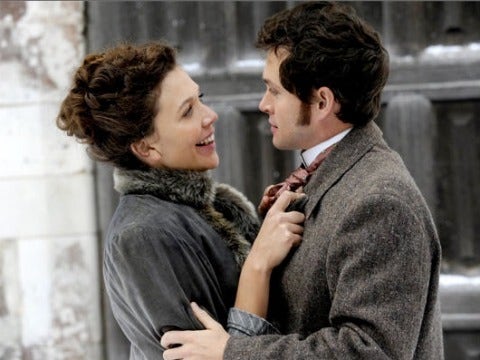'Hysteria': Be Glad You're Not A Woman In The Victorian Era
In the new movie 'Hysteria,' regular orgasms are what the doctor ordered.

Forget apples. An orgasm a day keeps the doctor away. People who have regular, satisfying sex live longer, stay in shape, and are generally happier. But during the Victorian era, from 1897 to 1901, sex was strictly viewed as a procreational activity between a woman and her husband. Or, an act between a man and whoever he wanted to have sex with.
Victorian women lived with this horrible double standard, along with the inability to vote or own property, limited educational opportunities, and those godawful hoop skirts and corsets. They were understandably dissatisified, which manifested itself in the form of anxiety, irritability, depression, insomnia, sexual dysfunction (ranging from frigidity to nymphomania), you name it. Doctors called it "hysteria," believing it had something to do with the uterus. One treatment: stimulating sufferers into paroxysms by massaging their most delicate parts.
Hmmm... Sounds like something a doctor used to do with my most delicate parts. When I was dating him.
So this is the setting of Hysteria, which came out May 18. "Female troubles" abound, and Dr. Mortimer Granville (Hugh Dancy) is hired to assist Dr. Robert Dalrymple (Jonathan Pryce) in their treatment. After some hands-on training — with a velvet curtain to preserve patients' modesty, of course — Mortimer is ready to deliver some sexual healing. And does he ever. The appointment books are filled, women return to the office for multiple sessions, and his hand is starting to ache.
But let's back up. One of the benefits of the job is room and board with the widowered Dr. Dalrymple and his daugher Emily (Felicity Jones). Mortimer's immediately smitten. Emily's the beautiful and demure heart of the house. Her older sister Charlotte (Maggie Gyllenhaal), on the other hand, is a hot-tempered and outspoken activist who's left the family home to run a settlement house. Her visits always end in yelling about her cause, which her stuffy father finds deplorable. To him, helping the poor is gauche. Massaging wealthy vaginas and calling it medical treatment is not.
Emily's hot and amiable and everything, but Mortimer has more in common with Charlotte. The two bond over their shared knowledge of germs. They banter. When a settlement house patron breaks her ankle, Mortimer treats her on the sly. The film has some nice historical touches. The scene in which the two of them make a plaster cast is one of them. The next day, Dr. Dalrymple tells his apprentice to stop assisting Charlotte's crusade.
As Mortimer's feelings for Charlotte start to change, his carpal tunnel syndrome — which I imagine they'd have called "hand-steria" back in the day — gets worse. When Mortimer fails to treat a patient successfully, Dr. Dalrymple fires him. If only there were an easier way for the young doctor to get women off... Mortimer crashes with his good friend Lord Edmund St. John-Smythe (Rupert Everett), a wealthy ne'er-do-well who loves inventing strange gadgets, including a feather duster that can spin and vibrate for easier cleaning.
Guess what they end up inventing together.
Hysteria is a delightful comedy about the strangely prudish history of the vibrator. It's also about how people can't fulfill their desires, sexual and otherwise, until they have the right tools. Much like a sex shop, it's got something for everyone: eye candy, sexual innuendo, period costumes, proto-feminism and romance. It's a shame the film is rated R, as it doesn't show any nudity or have any dirty words. But even in the NYC theater where I saw the movie, some women behind me seemed a bit uncomfortable at first. Let's stop making the female orgasm taboo once and for all.
Would you see Hysteria?
More juicy content from YourTango:
- Ladies, Here's How To Have An Orgasm That'll Blow Your MIND
- How To Have A Hands-Free Orgasm (Yes, It's Possible!)
- The Best Sex Advice On YourTango
